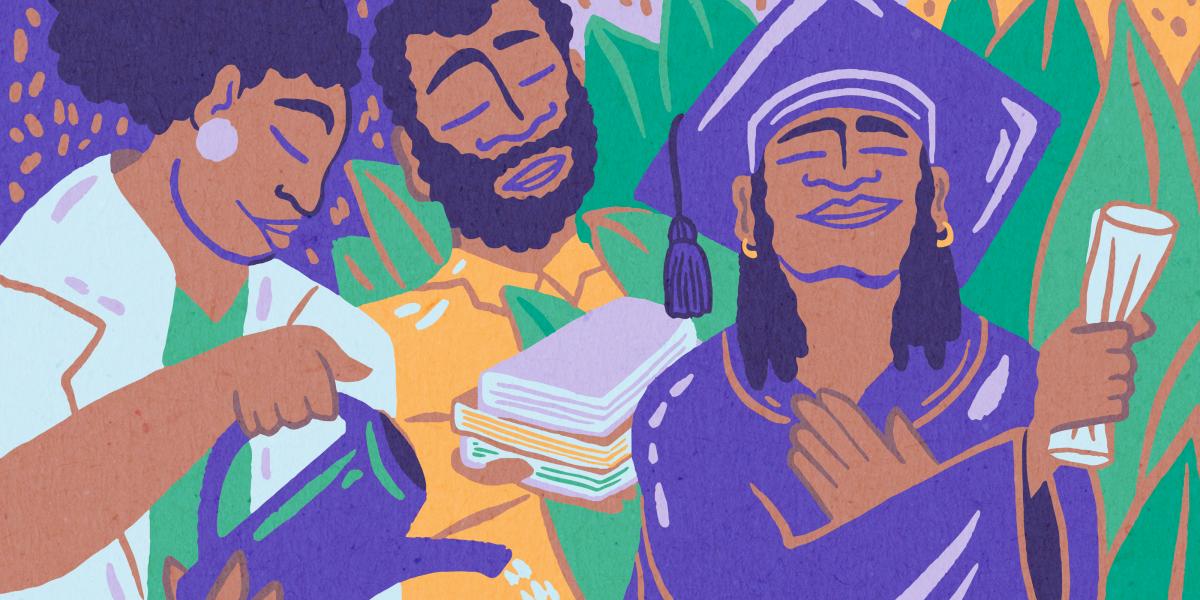Passing It Down
I’ve been preparing all my life to mentor the next generation of public health students.
I have benefited from supportive adults in Black spaces most of my life—in my childhood church, cultural groups, and my college. They offered critical lessons for how to succeed in predominantly white spaces like Johns Hopkins University.
This tradition of mentorship is central to Black academic culture. In fact, it was how I came to have a career in public health.
While I attended Spelman College in Atlanta in the 1990s, the handful of Black epidemiologists then at the CDC would visit local colleges to talk about public health as a career option. One of those folks was Bill Jenkins, PhD, MPH, MS, whose call for an end to the Tuskegee Syphilis Study as a member of the U.S. Public Health Service Commissioned Corps helped to eventually shut down the experiment. Funded by the CDC and conducted from 1932 to 1972, the infamous study knowingly withheld treatment for syphilis to study the disease trajectory in Black men. Participants were deceived and subjected to torturous and unnecessary medical procedures for decades. After the study ended, Dr. Jenkins ran a CDC program to provide medical care to survivors and advocated for them until their deaths.
This man was a public health giant, yet I remember him best as someone who welcomed me and a dozen other college students to his house for a cookout to talk about careers in public health. He helped me secure an internship with the Black Women’s Health Project and encouraged me to attend graduate school for public health.
Now, as vice chair for Diversity, Equity, and Inclusion in the Department of Mental Health, I find myself in a position to support the next generation of public health students. Since I began in this role in July 2020, I have come to realize that my new position is one that I have been training for all of my life—beginning with the invaluable lessons from my community, Dr. Jenkins, and other mentors.
Advocating for greater diversity in public health education has been a personal priority throughout my career. Now, I have a formal role in the process. It’s profoundly rewarding.
The tradition of mentorship is central to Black academic culture. In fact, it was how I came to have a career in public health.
Early on, some colleagues asked me to share ideas for recruiting underrepresented minority students to academic programs and training grants. The request was eye-opening. It never occurred to me that finding minority students interested in public health could present a challenge. Through my network of Black academics and contacts at conferences, I often reach out to interested students and provide them with information and connections to educational and career opportunities.
My Black faculty colleagues and I try to carry on Dr. Jenkins’ mentorship in our work as well. We strive to create a safe place for students from underrepresented minorities to open up about their concerns. They have mentioned thinking that faculty—in some classes—failed to address racism as a factor in certain issues or feeling that other students did not value their opinions—in a study group, for example.
We share our lessons learned, and we demonstrate a deep commitment to the communities we serve. We also do simple things to uplift others, like giving talks at local schools or meeting with the daughter of a School security guard because he told us she was smart and needed a mentor.
I sometimes reflect on my new role and my appointment to a Schoolwide committee coordinating the IDARE Action Plan—a set of strategies to cultivate a diverse, inclusive, and anti-racist environment for the School community and promote research and training on racism’s impact on health. I am acutely aware of how my experiences have shaped my vision of what a fully inclusive Johns Hopkins will look like.
It’s not just strategic plans and monitoring progress. It’s a transformation to becoming a space where we all look out for one another—genuinely. It’s becoming a place where we are sensitive to the many barriers that our students face and the need to understand how racism and other forms of structural disadvantage shape risk for health problems.
I can imagine a Johns Hopkins where all faculty are deeply committed to building a beloved community of scholars and to making the academy a more inclusive place for those who come after us.
